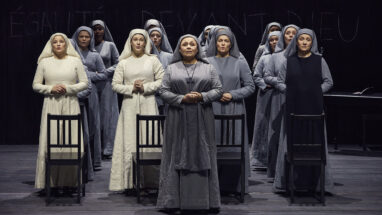
Melodies from the monastery – Dialogues des Carmélites and the resistance of the nuns
Francis Poulenc chose the voices of nuns to discuss the crisis of post-war France and the internal struggles of an individual in his most grandiose work, Dialogues des Carmélites.
The human voice is at the very core of Francis Poulenc’s (1899–1963) music. The composer is best known for his whimsical solo songs set to surrealist poetry, but his choral music reveals another side to him. At the age of 37, Poulenc had a profound spiritual experience in the Rocamadour mountain chapel in Southern France. The result was the Litanies à la Vierge noire (1936) for treble choir, which is like a personal prayer. It was the first in a series of religious vocal works, including motets, a mass, and Stabat Mater. This series culminates in the opera Dialogues des Carmélites, first performed in 1957, drawing from the story of the Carmelite nuns guillotined during the French Revolution in 1794.
Scholarly life in a convent
In the 18th century, it was common for aristocratic families to send their daughters to convents, as not all could afford to pay dowries. Many were confined within the convent’s walls against their will, but becoming a nun did not necessarily equal imprisonment.
At that time, a monastic career was one of the few ways a woman could achieve an independent status. It also presented a chance for academic study and professional engagement in music. Recently, religious writings by women and compositions created in nunneries have sparked growing interest. In their time, the 17th-century Northern Italian nuns, Isabella Leondara and Chiara Margarita Cozzolani, for instance, enjoyed significant renown, even on an international scale.
Though the nuns were not seen, their voices were heard outside the convent through their music. Poulenc chose the voices of nuns for his grandest work to comment on the crisis of post-war France. During World War II, France was occupied by Nazi Germany for four years. In the 1950s, the process of dealing with this trauma was only just beginning.
Listen to music composed by nuns
Freedom and resistance
In Dialogues des Carmélites, the revolutionary terror of the 1790s represents the German occupiers. The nuns steadfast in their faith symbolise the French Resistance, which Poulenc supported. Due to his homosexuality, Poulenc faced particular danger during the Nazi occupation and had to be cautious, expressing his stance only through his music. His vibrant anthem of freedom, Figure Humaine (Human Figure), is a choral work set to the poems of Resistance member Paul Éluard. Its scores were kept carefully hidden from the occupiers. Soon after the liberation of France, Poulenc composed the choral suite Un soir de neige (A Snowy Evening), in which Éluard verbalised the feelings of the resistance fighters:
Night, cold, solitude
Closed carefully in upon me
But the branches sought out their path in the prison
Around me the grass found the sky
The sky was bolted shut
My prison came tumbling down
The living cold, the burning cold
Holds me firmly in its hand.
(English translation: Graham Stibbs)
Poulenc was touched by the humanity and optimism of Éluard’s poetry. From his perspective, the Carmelite nuns’ relentless faith in spiritual values was revolutionary, while the revolutionary authorities’ disruption of the convent life was a form of violent tyranny.
The Carmelites’ faith in their convictions can also be paralleled with Poulenc’s art. Whereas the French Revolution outlawed religion, post-war modernism banned the traditional parameters of music. Poulenc held onto tonality, blending influences from the baroque and classical periods with jazz tones to create his distinctive musical language, which is marked by poignant sensitivity and piercing pain. In Dialogues des Carmélites, the harrowing events and pared-down melodic lines are kept aloft by stunningly beautiful harmonies.
Text AULI SÄRKIÖ-PITKÄNEN
Photo VINCE PONTET/Théâtre des Champs-Élysées
Listen to Francis Poulenc and music from Dialogues des Carmelites
Dialogues des Carmélites at the Finnish National Opera 26.1.2024 – 23.2.2024.

